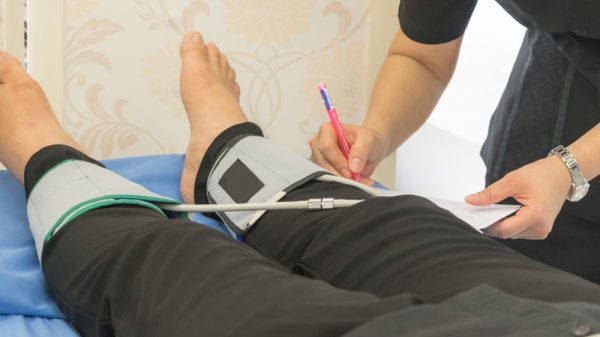Have you ever felt your heart start racing? Maybe you are experiencing an adrenaline rush or you are stressed. Either way, a racing heart is often a normal part of being human. Here we go over why your heart might be racing, combined with strategies for how to lower your heart rate. Read on to find out more!
Why Is My Heart Racing?
Before we dive into strategies for lowering your heart rate, let’s take a look at why your heart might be racing. Even though a quick heartbeat might be concerning or scary, there is a multitude of factors that might explain why your heart might be racing.
- You were startled or experienced an intense emotional reaction. We all know that feeling when we get unexpectedly scared or surprised, like when someone makes an unpredictable move in traffic that causes you to react quickly and slam on your breaks to prevent an accident. When this happens, your pupils dilate, you start sweating, your mouth goes dry, your adrenaline is pumping, and it’s as if your body goes into autopilot. Most likely, after a scenario like this, your heart is left racing as you recover from the situation that just unfolded.
- You are under a lot of stress. When we are under a lot of stress, the body reacts by releasing a lot of adrenaline and the stress hormone cortisol. High levels of adrenaline and cortisol in the bloodstream can cause your heart rate to go up higher than usual.
- You have anxiety. As is the case when you are under a significant amount of stress, anxiety causes the levels of adrenaline and cortisol in the bloodstream to go up significantly. An anxiety attack or panic attack can trigger a sympathetic nervous system reaction, which causes you to sweat and experience a racing heart rate.
- You are rigorously exercising. During strenuous exercise, the heart must beat rapidly to keep up with the amount of energy that the body is expending. When exercise is vigorous, the body utilizes oxygen and energy at a rapid rate and blood flow must replace nutrients accordingly, which drives up the heart rate.
- You have low blood pressure. During low blood pressure attacks, the heart rate increases. During episodes of low blood pressure, insufficient amounts of blood make it up to the upper half of the body, including the heart. If you have low blood pressure, much of your blood is hanging out in the lower half of your body. To compensate, your heart will begin beating harder and faster in an effort to circulate blood throughout the body.
Precautions
Before we go any further, let’s quickly take a look at when you should seek medical help for a racing heart. In many circumstances, a racing heart is a natural response to a certain stimulus. However, rarely, a racing heart is an indication that something else is wrong. You are at a higher risk of heart issues if you are older in age and have a family history of heart disease. A racing heart may be a sign of cardiovascular disease, thyroid disease, heart failure, blood clots, or other medical conditions. If you experience any of the following symptoms, it’s critical to seek medical attention immediately:
- Persistent irregular heart rate
- Chest pain
- Lightheadedness
- Fainting
- Shortness of breath
It’s also important to note that there are no rules regarding when to seek medical advice. If you are concerned about your heart, it’s a good idea to get checked out just to make sure that it’s nothing serious.
How Can I Quickly Lower My Heart Rate?
Are you wondering how to slow your heart rate? If you’ve been startled, experienced an anxiety attack, or are recovering from exercise, there are a few ways to reduce your fast heart rate to normal levels. Here are some tips if you’re looking for how to slow down the heart rate.
1. Deep Breathing
Deep breathing is extremely effective, especially during an anxiety attack or after an adrenaline rush. To recover from anxiety or adrenaline, close your eyes and draw in long breaths through your nose. Exhale slowly through the mouth. Each inhales and each exhale should take at least 5 seconds. If you want, you can even put two fingers on your neck to monitor your heart rate. After a few deep breaths, you should feel your pulse begin to slow down. Repeat until you feel your heart rate returning to normal.
2. Meditation
Meditation is a practice that incorporates deep breathing, but it is also intended to center the mind. Meditating helps your mind focus on the present moment, and to accept the present moment. Engaging in meditation during stressful times can help you manage stress and anxiety effectively, therefore helping to lower your heart rate.
3. Cooling Down After Exercise
After an intense workout, avoid simply rushing on to your next activity. Give your body a few minutes to wind down, recover, and return to homeostasis. This can be done by walking or stretching.
4. Medications
If your heart races often or you have chronic anxiety or panic attacks, medical intervention may be needed. Physicians often prescribe beta blockers for a range of heart-related issues. Beta blockers work by essentially blocking the effect of adrenaline on the heart that is responsible for a rapid increase in heart rate.
What Is a Normal Resting Heart Rate?
A normal heart rate at rest ranges between 60 and 100 beats per minute (bpm). Some people may have a resting heart rate of 65 bpm, while others may have a resting heart rate of 90 bpm. This number varies depending on numerous factors, such as gender, age, physical fitness level, and genetics.
How Can I Lower My Resting Heart Rate?
If you want to achieve a lower resting heart rate, physical activity is the key. Your fitness level is a significant determinant of your resting heart rate. If you have a very high resting heart rate, the chances are that you are not in the best shape. The good news is that you can make changes in your daily life that help lower your resting heart rate. Taking care of your overall heart health by exercising consistently and eating a healthy diet can help lower your resting heart rate.
How to Support Overall Heart Health
Even if you haven’t been diagnosed with any heart conditions or related health problems, there are steps you can take to protect the overall health of your heart.
1. Strive for a Healthy Body Weight
Maintaining a healthy body weight is vital when it comes to protecting your heart. When the body is carrying around excess weight, this puts you at risk for high cholesterol levels. If you have excess fat deposits in the abdomen, this means that fat is surrounding all organs, which places strain on the heart.
When your body weight falls within a healthy range, your heart isn’t as strained to push blood around your body.
2. Cut Out Saturated Fat
Saturated fat is a major culprit in deteriorating heart health. When saturated fat builds up in the bloodstream, it drives up cholesterol levels. When cholesterol levels get too high, cholesterol congeals with other particles in the bloodstream to form plaques on the walls of blood vessels. This process of plaque formation is called atherosclerosis. These plaques are extremely dangerous because, over time, they tend to get larger. If they break off, they can travel throughout the circulatory system and lodge in the heart, lungs, or brain, causing a heart attack or stroke. A heart attack can weaken the heart muscle.
3. Get High-Quality Protein
Did you know that the heart is a muscle that needs adequate protein to keep the heart muscle strong? Proteins found in muscle tissue, including the heart muscle, must be replaced on a daily basis. More specifically, the amino acids found in muscle tissue turn over every 24 hours and must be replaced. Amino acids are found in the foods we eat, and we require essential amino acids on a daily basis. This is because the body is unable to synthesize essential amino acids internally.
In order to get all essential amino acids on a daily basis, it’s crucial to eat high-quality protein. All animal sources of protein offer balance ratios of essential amino acids. Lean meats, low-fat dairy, and fatty fish are all excellent sources of protein. If you follow a plant-based diet, make sure to combine nuts, seeds, beans, whole grains, and tofu on a daily basis. Getting balanced ratios of essential amino acids help support protein synthesis and muscle maintenance, in critical organs like the heart.
4. Eat Tons of Fruits and Veggies
A healthy diet can work wonders for heart health. Fruits and veggies exhibit powerful anti-inflammatory and antioxidant properties that protect the heart and cardiovascular system. Fruits and vegetables contain vitamins, minerals, and antioxidants that help the endothelium – the lining on the insides of blood vessels – contract and dilate properly. Antioxidants, vitamins, and minerals exert an antioxidant effect and reduce oxidative stress and inflammation, allowing the endothelium to do its job properly.
5. Exercise Consistently
Exercising consistently is an excellent way to strengthen your heart. The Mayo Clinic provides helpful advice on how to calculate your maximum heart rate during exercise. To determine your healthy maximum heart rate during exercise, you should subtract your age from 220 bpm. (1) For example, for a 35-year-old person, the healthy maximum heart rate would be 185 bpm. (1)
Spending quality exercise time at your maximum heart rate helps strengthen your heart muscles without overexerting and causing damage.
So, how does exercise strengthen the heart muscle? During periods of exertion, body tissues are utilizing oxygen at a rapid rate. As a result, the heart muscle must help deliver oxygen and nutrients to all cells. The heart pumps harder and faster to encourage efficient blood flow throughout the body. Over time, the heart muscle becomes more effective as it pumps. With each beat, the heart becomes more able to effectively push blood throughout the circulatory system. As a result, your resting pulse rate decreases, since fewer heartbeats are needed for blood to reach all cells and tissues in the body.
6. Cut Out Sodium and Added Sugars
Both sodium and added sugars are culprits in high blood pressure. It’s important to first point out that high blood pressure doesn’t necessarily correlate with a high heart rate. You can have a low heart rate at rest and still have high blood pressure. However, overall, maintaining healthy blood pressure is necessary to promote cardiac health and the health of all blood vessels throughout the body.
In addition to exercising consistently, it’s also a good idea to cut out sodium and added sugars. Excess salt is common in the American diet. Many prepared foods, restaurant foods, and packaged items contain excess salt as a preservative.when you eat too much sodium, the body retains excess fluid, which drives up your blood volume levels. Although temporarily this causes no harm, the chronic consumption of high levels of sodium can inflict consistent strain on blood vessel walls. Over time, the inner walls of blood vessels become scarred and are no longer able to constrict and dilate properly. The blood vessels become rigid, resulting in chronic high blood pressure.
Added sugars also scar blood vessel tissues over time, but for different reasons. When we eat foods that are rich in added sugars, The body breaks down sugar molecules into glucose molecules, which are rapidly absorbed into the bloodstream. This causes blood sugar levels to skyrocket, and all tissues and cells in the body are exposed to excess levels of glucose..when this occurs on a chronic basis, excess glucose causes inflammation within blood vessels, contributing to scarring and high blood pressure.
7. Stop Using Tobacco Products
Tobacco products, such as cigarettes, contain a significant amount of nicotine. The consumption of nicotine can contribute to high blood pressure and a resting heart rate that is higher than normal. To prioritize the health of your heart, it’s a good idea to cut back on nicotine.
8. Limit Alcohol Consumption
Alcohol use can wreak havoc on many organ systems. Drinking too much alcohol can contribute to inflammation in the liver, skin, brain, blood vessels, and heart. If you’ve ever had a nasty hangover, you might have noticed that your resting heart rate was much higher than normal. This is due to two major factors.
First of all, alcohol is a depressant, meaning it suppresses the activity of epinephrine and norepinephrine, which are responsible for the adrenaline effect. The following morning, as the alcohol wears off, you experience a rebound effect in which these chemicals surge and cause your heart rate to rise above normal.
Secondly, alcohol inflicts inflammation on the entire body, which is why you just feel overall crummy the next day. Your heart rate is elevated as the body works to recover from inflammation.
Eliminating or limiting your alcohol consumption prevents alcohol-related inflammation in the heart and circulatory system.
What Happens When the Heart Beats Too Slowly?
When the heart beats too slowly, this is called bradycardia. For more information, visit our article on bradycardia.
How to Lower Your Heart Rate: Conclusion
When you feel your heart starting to race, it can feel very scary. Your heart might be racing in reaction to an emotional trigger, adrenaline rush, stress, or low blood pressure. Many instances of racing heart rates are normal and you can achieve a lower heart rate by using breathing techniques and other strategies. However, if your symptoms seem unattached to triggers and are accompanied by crushing chest pain, shortness of breath, and lightheadedness, seek medical attention immediately.

References:
(1) https://www.mayoclinic.org/healthy-lifestyle/fitness/in-depth/exercise-intensity/art-20046887























